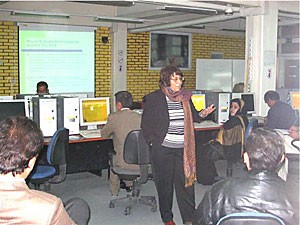The UA library system is creating a digital library for use by university students in Afghanistan.
Atifa Rawan, a librarian at the UA Main Library, has been working with a team of other librarians and graduate students since 2002 to digitize Afghan books and documents and to obtain access to scholarly databases for students at 19 universities in Afghanistan.
With the country working toward rebuilding its infrastructure, the Afghanistan Digital Libraries, an online platform of information and databases stored in the United States, is a more stable option than purchasing books and materials, Rawan said.
“”Books and materials have been destroyed, so to collect materials and books, it doesn’t make sense at this point,”” she said.
“”Especially fields in medicine and science,”” she added. “”They have very outdated books even if they have any left, and that’s not useful. So we’re really trying to give them up-to-date information to really be able to do research.””
Collecting and preserving these documents is important to the preservation of Afghan history, as materials were destroyed during years of war and political strife.
“”Had we been there during the civil war, we would have had more things to salvage,”” Rawan said. “”With the country in a state of influx politically, anything could go wrong any day, so we’ve been trying to salvage.””
Eventually, Rawan said, the server will be moved to Afghanistan. The team will train librarians there to take over administration of the project.
The Afghanistan Digital Libraries is an online collection of documents in English and in the native languages of Afghanistan, including Dari, an Afghan dialect of Persian, and Pashto, among others.
The system also offers online databases that have been offered for free by the documents’ publishers.
While the
I think the future of this is really to have a great potential for researchers who would never really have the access to information and materials from Afghanistan, and then vice-versa.
-Atifa Rawan,
librarian
collection is offered to all university students in Afghanistan, it can be difficult for students outside of the main cities to use, as for them electricity and Internet access are not readily available, Rawan said.
Yan Han, a systems librarian working with the project, said he believes the Afghanistan Digital Libraries comprises the most extensive collection of digitized Afghan documents.
“”We finished 65,000 pages of Afghan history,”” he said.
Han works on the technical infrastructure for and implementation of the project. He has visited Afghanistan three times, working to train faculty and students in using the collection.
Working on the project has been a challenge, as the team has faced conflicts with communication and safety, Han said.
The team uses Skype, an online telephone service, to speak to their Afghan counterparts. Any packages the team ships to the country take weeks to arrive, Han said, as once FedEx sends them, it must contract with another company, because FedEx does not deliver to Afghanistan.
In August, Han and Rawan’s trip to the country was canceled due to security reasons after a hostage situation arose with South Koreans working in the country.
Han arranged to meet a Afghan colleague in Dubai, the main city in the United Arab Emirates, to provide instruction on digitizing documents.
Currently, the team of UA librarians is working to digitize 34 volumes of the Afghanistan yearbook and volumes of the country’s political, social and economic histories, Rawan said. Many books of these types were damaged during the turbulent years of Taliban rule following Soviet withdrawal in 1989, Rawan said.
“”It’s really rare,”” she said. “”(The Afghanistan yearbook) was damaged and destroyed. For any researchers to really get their hands on this type of publication is fabulous.””
The team is also working with Afghan students and teachers to digitize a collection of Afghan literature from 1989 to 2002.
The books were preserved by an Afghan historian, who moved them out of the country. Now, the literature is back in Afghanistan and being digitized, Rawan said.
“”I’m very excited about that because that collection is very, very useful to historians and people doing research and, ordinarily, they don’t have access to that,”” Rawan said.
She thinks the project has come a long way in moving the country into the 21st century.
“”I think the future of this is really to have a great potential for researchers who would never really have the access to information and materials from Afghanistan, and then vice-versa,”” Rawan said. “”We’re really bringing a different level of education to students in Afghanistan that otherwise they would not be able to have.””









